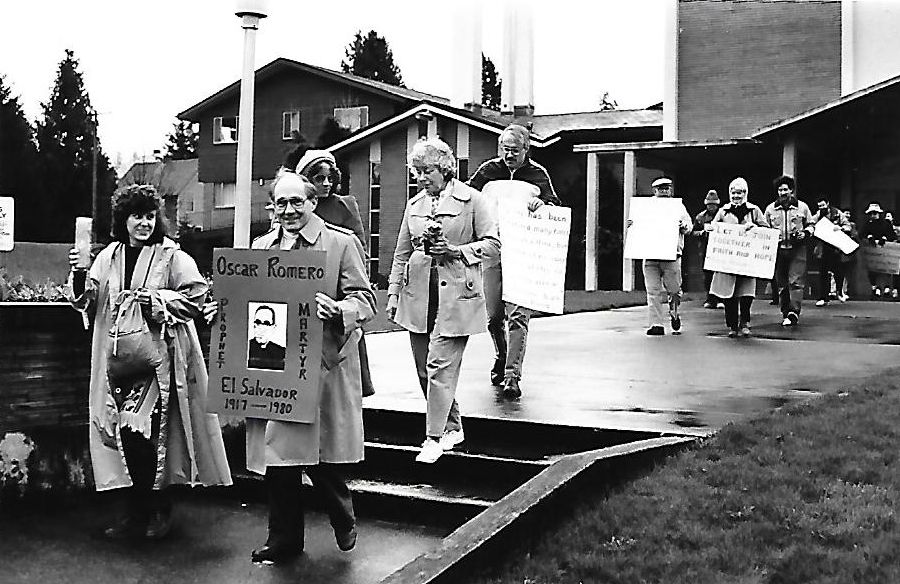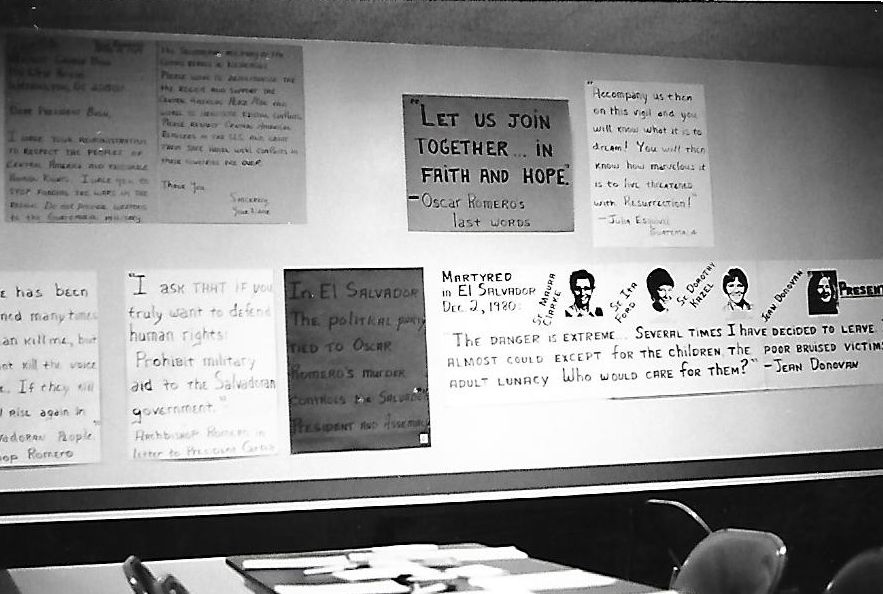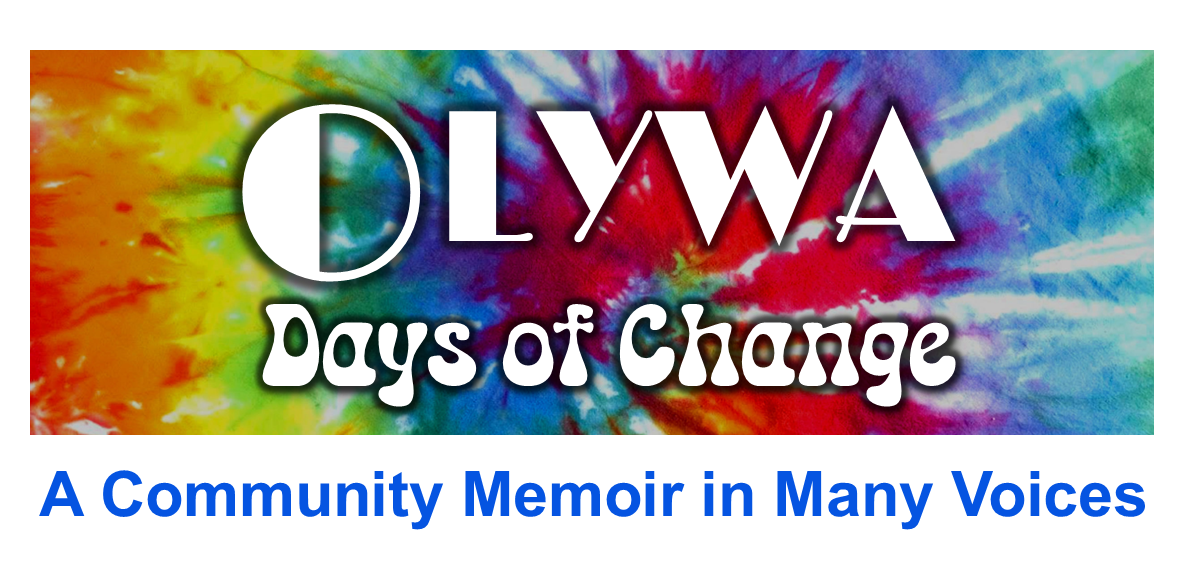ARRIVALS
Olympia Offers Sanctuary to a Salvadoran Family 1983-1986
By Bob Zeigler
In the early 1980s, Saint Michael Catholic Church joined the national public Sanctuary Movement for Salvadoran and Guatemalan refugees who fled the wars in their countries but were denied US asylum or any status when they arrived.

According to international law and the US Refugee Act of 1980, these asylum seekers met the refugee criteria and should have received asylum or at least temporary protected status, but were deported by the Immigration and Naturalization Service to the military forces they were fleeing in their homelands. The Reagan State Department considered those military governments and death squads to be allies in the US worldwide war against communism and they considered refugees from Central America to be “communist terrorists.”

In the 1970s and 1980s, the Catholic churches in North, Central, and South America began to focus on principles and did some good charity work. But justice was often absent and the church needed to follow the principle of “preferential option” for the poor in solidarity with oppressed people. A progressive reform movement grew, and nuns, lay persons, clergy, and bishops provided energy toward this in many forms such as evidenced in Catholic Worker Houses, Catholic Peace Fellowship, and Pax Christi peace and justice movement groups. Seattle’s Archbishop for Western Washington, Raymond Hunsthausen, promoted preferential option for the poor. He protested at the Trident submarine base that he called the Auschwitz of Puget Sound, refused to pay war taxes, and told Catholics it was their responsibility to provide sanctuary to Central American immigrants at risk in the US. Saint Michael Church in Olympia became one of parishes to heed that call with their Social Justice Committee taking the lead.
Before deciding, the parish went through three months of discussions and discernment looking at needs, risks, and benefits of doing this, and in a parish vote, more than 70% of members voted to become a sanctuary church. Four hundred members signed up to help in some way and raise the funds to support a family. The parish then sent a letter to the US Department of Justice saying why the church was offering public sanctuary in church tradition. All elements of the process were public.

The church received a Salvadoran family of five—a father and four teenage children— that was willing to speak publicly about their experiences in El Salvador and why they had to flee for their lives.
Although the parish sponsored them, people here in Olympia and in Thurston County adopted them, too. Their prime support committee included Spanish speakers throughout the county, Evergreen State College students, people who had worked in refugee camps, and members of other faith communities. The Olympia City Council adopted a City of Peace resolution. One police officer told the 15-year-old Salvadoran girl that he was happy she and her family were here and he just hoped they might help his daughter learn Spanish. Schoolmates surrounded them to protect them when they thought a man in a suit might be an INS agent as he approached. It turned out he was the sanctuary program coordinator.
The family spoke about their lived experiences in the war and their escape from the military that cut their cousin to pieces with machetes. They did this before reporters, in schools and churches, at meetings and universities, and before the Washington State Legislature. This resulted in passage of a memorial resolution to President Reagan and Congress calling for a classification of Temporary Protected Status for Central American refugees who did not have status in the US.
In 1986, the family said they wanted to move on. Since they could not go back, and asylum was not possible in the US. They wanted to go to Canada where landed immigrant status and asylum were available. They said Sanctuary met their needs but after three years they were not free. They described church sanctuary as an important need but also a jail, “a jail of gold.” They were ready to move on. With assistance from an attorney, the church and community worked to file paperwork for Canadian asylum and it was granted. They were received with status in Montreal and became Canadian citizens. The teens finished high school, went on to college, and have professional careers and families of their own.
Sanctuary in Olympia for this family was motivated by Salvadoran military and death squad massacres of anyone who stood with the poor: students, labor movements, nuns including four US church women, priests, and even El Salvador’s Archbishop Oscar Romero in 1980. Interfaith communities were aware of the atrocities and supported Sanctuary. Local college students played a major role in the public education here and Evergreen students helped organize the community.
In 1979 – 1980, John Calambokidis coordinated an Olympia group with a number of TESC students. It was called Olympians Against Intervention in El Salvador and was very effective. From 1979 to 2004 Saint Michael’s had a peace and justice committee called the Social Justice Committee. In 1982, Beth Harris and Beth Hartmann asked if they could speak to the committee about the situation in El Salvador and the plight of refugees in the US. At one of our meetings Beth Harris told us about a church sanctuary movement starting up in Tucson. At the end of the meeting she said she could see that Saint Michael Church would join the sanctuary movement that was starting in Arizona. She stressed that it was important to make sure becoming a sanctuary church did not happen too fast. “The parish should struggle with the decision to really own it,” she advised.
Olympia had a long history of supporting refugees. In the early 1900s, Olympians supported Chinese immigrants who were rejected elsewhere. And at the end of the Vietnam war Olympia provided community support for Vietnamese and Cambodian refugees. A progressive window of opportunity opened within the US Catholic church and these factors came together. They inspired the church and the Olympia community and set the stage for future immigrant support and protection work in other venues. In 2016, with the election of Donald Trump, the City of Olympia became a Sanctuary City and that was reaffirmed in 2024.
We encourage readers to contact us with comments and corrections. Disclaimer

